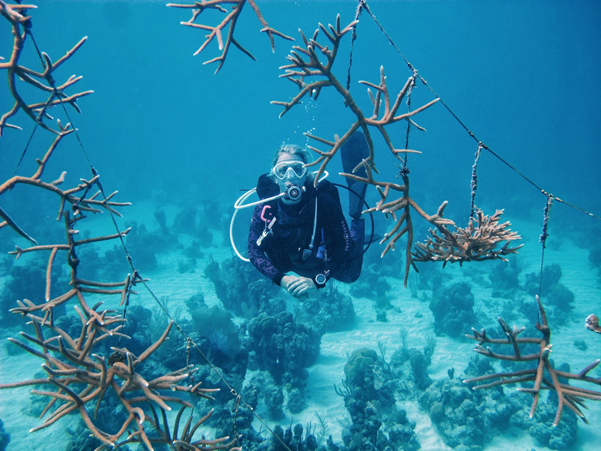Bahamas-based research says there are many factors to consider
NASSAU, BAHAMAS — With nearly 27 percent of the world’s coral reefs lost to destructive events and stressors, a newly released study suggests hybridization could save one of the world’s most important and threatened marine ecosystems.
Research published in the journal Frontiers in Marine Science found a naturally occurring hybrid coral and its fragmented sections are more resilient and grow more rapidly in comparison to its parental species. The study suggests restoration managers use the hybrid, commonly called fused staghorn coral, to outplant degraded reefs and increase the scale of coral nursery projects.

“Coral restoration research by the Perry Institute for Marine Science (PIMS) and its partners demonstrates how we can bring back populations of critically endangered coral species in The Bahamas and help them adapt to their changing climate to prevent them from going extinct,” said Dr Craig Dahlgren, PIMS’ executive director who’s an expert in tropical marine ecosystems.
In the study, “Should Hybrids Be Used in Coral Nurseries?” PIMS identified hybrids’ untapped potential, alongside researchers from Florida’s Nova Southeastern University and the University of North Carolina Wilmington. The study was conducted at three nurseries on Great Stirrup Cay, Berry Islands, from June 2018 to July 2019.
The problem with coral reef ecosystems lies in their decades-long decline due to rising sea temperatures, increased disease prevalence, pollution, overfishing, climate change and the like. Finding ways of protecting these natural resources is critical to the continuity of life around the world.
That’s because coral reefs host a range of ecologically and commercially important marine species. They are essential nursery grounds for numerous fish and invertebrates. They protect coastlines from storm damage and support an extensive tourism industry for many island nations like The Bahamas.
To facilitate coral reef recovery and increase abundance and genetic diversity, many conservation organizations throughout the Caribbean create and maintain coral nurseries, sheltered areas for corals to grow faster away from the reef and predators.

In this “coral gardening” method, nursery-grown reefs are transferred to the ocean during large-scale restoration efforts. PIMS and its coral restoration branch, the Reef Rescue Network, manage 27 coral nurseries on islands in The Bahamas alone.
The study investigated factors that may influence growth and survival of threatened Caribbean coral species and their naturally occurring hybrid at the Reef Rescue Network’s Berry Islands’ nurseries in central Bahamas. One of the study’s main funders, Norwegian Cruise Line, maintains these private nurseries for conservation and research with Nova Southeastern University.
“For coral species that are on the verge of extinction in The Bahamas, growing corals in nurseries is a viable means of preserving genetics, repopulating reefs with these species, and providing habitat to the abundance of life that depends on coral reefs,” said Dahlgran.
While the parental species have been in decline, the hybrid has persisted on many reefs in the Caribbean with equal or increased abundance, better survival and equal or less susceptibility to disease and other environmental pressures.
Scientists are therefore convinced “the benefits of including fast-growing hybrid coral to quickly increase reef structure likely outweighs the potential long-term drawbacks”.
Nevertheless, there is at least one concern. Hybrids could potentially reduce genetic diversity since their quick growth and resilience might disrupt the natural order of things.


